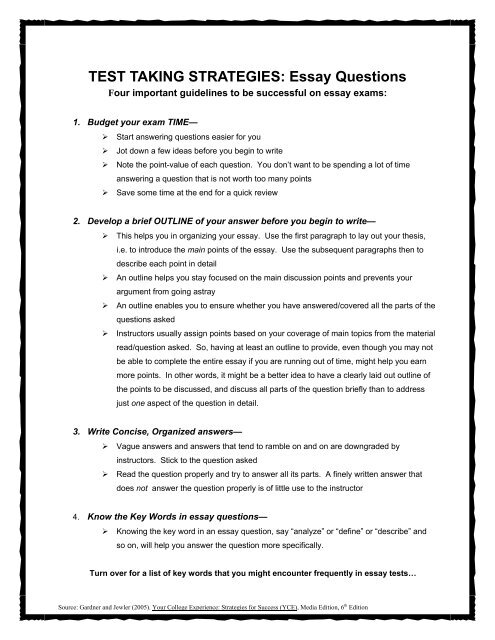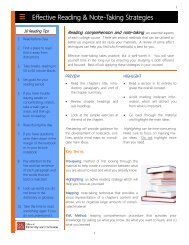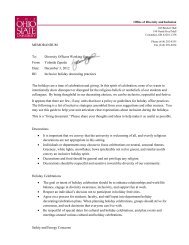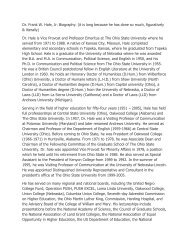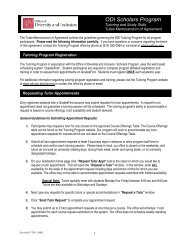TEST TAKING STRATEGIES: Essay Questions
TEST TAKING STRATEGIES: Essay Questions
TEST TAKING STRATEGIES: Essay Questions
Create successful ePaper yourself
Turn your PDF publications into a flip-book with our unique Google optimized e-Paper software.
<strong>TEST</strong> <strong>TAKING</strong> <strong>STRATEGIES</strong>: <strong>Essay</strong> <strong>Questions</strong><br />
Four important guidelines to be successful on essay exams:<br />
1. Budget your exam TIME—<br />
! Start answering questions easier for you<br />
! Jot down a few ideas before you begin to write<br />
! Note the point-value of each question. You don’t want to be spending a lot of time<br />
answering a question that is not worth too many points<br />
! Save some time at the end for a quick review<br />
2. Develop a brief OUTLINE of your answer before you begin to write—<br />
! This helps you in organizing your essay. Use the first paragraph to lay out your thesis,<br />
i.e. to introduce the main points of the essay. Use the subsequent paragraphs then to<br />
describe each point in detail<br />
! An outline helps you stay focused on the main discussion points and prevents your<br />
argument from going astray<br />
! An outline enables you to ensure whether you have answered/covered all the parts of the<br />
questions asked<br />
! Instructors usually assign points based on your coverage of main topics from the material<br />
read/question asked. So, having at least an outline to provide, even though you may not<br />
be able to complete the entire essay if you are running out of time, might help you earn<br />
more points. In other words, it might be a better idea to have a clearly laid out outline of<br />
the points to be discussed, and discuss all parts of the question briefly than to address<br />
just one aspect of the question in detail.<br />
3. Write Concise, Organized answers—<br />
! Vague answers and answers that tend to ramble on and on are downgraded by<br />
instructors. Stick to the question asked<br />
! Read the question properly and try to answer all its parts. A finely written answer that<br />
does not answer the question properly is of little use to the instructor<br />
4. Know the Key Words in essay questions—<br />
! Knowing the key word in an essay question, say “analyze” or “define” or “describe” and<br />
so on, will help you answer the question more specifically.<br />
Turn over for a list of key words that you might encounter frequently in essay tests…<br />
Source: Gardner and Jewler (2005). Your College Experience: Strategies for Success (YCE), Media Edition, 6 th Edition
Key Words<br />
Analyze: To divide something into its parts in order to understand it better; to show how the parts work<br />
together to produce the overall pattern.<br />
Compare: To look at the characteristics or qualities of several things and identify their similarities or<br />
differences. Do not just describe the traits; define how the things are alike and how they are different.<br />
Contrast: To identify the differences between things.<br />
Criticize/Critique: To analyze and judge something. Criticism can be positive, negative, or both. A<br />
criticism should generally contain your own judgments (supported by evidence) and those of other<br />
authorities who can support your point.<br />
Define: To give the meaning of a word or an expression. Giving an example sometimes helps to clarify a<br />
definition, but an example by itself is not a definition.<br />
Describe: To give a general verbal sketch of something, in narrative or other form.<br />
Discuss: To examine or analyze something in a broad and detailed way. Discussion often includes<br />
identifying the important questions related to an issue and attempting to answer these questions. A good<br />
discussion explores all relevant evidence and information.<br />
Evaluate: To discuss the strengths and weaknesses of something. Evaluation is similar to criticism, but<br />
the word evaluate places more stress on the idea of how well something meets a certain standard or<br />
fulfills some specific purpose.<br />
Explain: To clarify something. Explanations generally focus on why or how something has come about.<br />
Interpret: To explain the meaning of something. In science, you might explain what an experiment<br />
shows and what conclusions can be drawn from it. In a literature course, you might explain—or<br />
interpret—what a poem means beyond the literal meaning of the words.<br />
Justify: To argue in support of some decision or conclusion by showing sufficient evidence or reasons in<br />
its favor. Try to support your argument with both logical and concrete examples.<br />
Narrate: To relate a series of events in the order in which they occurred. Generally, you will also be<br />
asked to explain something about the events you are narrating.<br />
Outline: To present a series of main points in appropriate order. Some instructors want an outline with<br />
Roman numerals for main points followed by letters for supporting details. If in doubt, clarify with the<br />
instructor whether he or she wants a formal outline.<br />
Prove: To give a convincing logical argument and evidence in support of some statement.<br />
Review: To comment on the main points of a problem or a series of statements. A review question<br />
usually also asks you to evaluate or criticize.<br />
Summarize: To give information in brief form, omitting examples and details. A summary is short yet<br />
covers all important points.<br />
Trace: To narrate a course of events, drawing connections from one event to the next.<br />
Source: Gardner and Jewler (2005). Your College Experience: Strategies for Success (YCE), Media Edition, 6 th Edition


